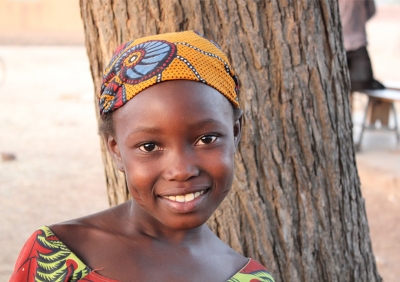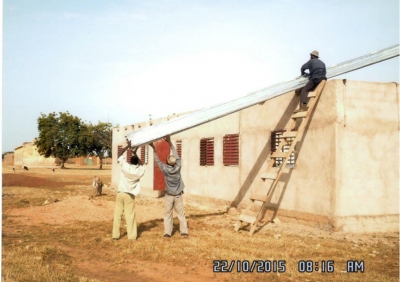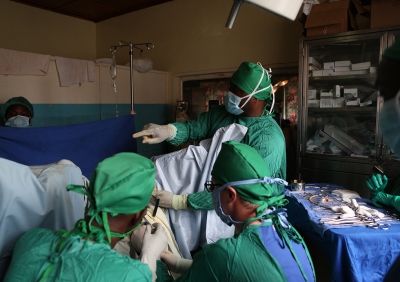Personal stories by victims and circumcisers
While talking about the different types of FGM is an important part of SAIDA’s educational work, the true horror of this practice can only be understood through testimonies by the affected women. “The Hosken Report”, written by Fran P. Hosken and first published in 1979 by the Women’s International Network News, does that by featuring personal stories by African women and men. To give the victims a human face and educate about this horrendous practice, we cite a few poignant stories below:
A Sudanese woman tells her story:
“I was infibulated when I was five years old. It hurt so much that I cried and cried. When I was nearly twelve, my aunts one day examined me. They declared that I was not closed enough. They took me to the midwife who lives a few streets away. When I noticed where they were taking me, I tried to run away, but they held me tight and dragged me into the midwife’s house. I screamed for help and tried to free myself but I was not strong. They held me down and put a cover over my mouth so I could not scream. Then they cut me again; and this time, the woman who operated on me made sure that I was closed.
I don’t know how many days I was lying there. The pain was terrible. I was tied up and could not move. I could not urinate; my stomach became all swollen. I was terribly hot one moment, then shaking with cold. Then the midwife came again. I screamed as hard as I could, as I thought she was going to cut me again. Then I lost consciousness. I woke up in a hospital ward. I was terrified; I did not know where I was. I was in terrible pain; my genital area was all swollen and hurt all the time. Later I was told that the infibulation had been cut open to let the urine and the pus out. I was terribly weak, and I did not care anymore. I wanted to die.
It is years later now. The doctors told me that I could never have children because of the infibulation. Therefore, no one will marry me; no one wants a wife who cannot have a child. I sit at home alone and I cry a lot. I look at my mother and my aunts, and I ask them: ’Why did you do this terrible thing to me?’”
Fran P. Hosken: The Hosken Report – Genital and sexual mutilation of females. Winnews, 1993, S. 108
A teacher from West Africa tells the story of his sister:
“It is our custom that at the age of eighteen, when the girls want to get married, they have to go through excision. The time came for my sister to be excised. One day, very early in the morning, my sister, with other village girls, was taken outside the village to the place where these procedures are usually conducted. After some time, one of the old women who take care of the operations came to our house and said that there were some complications. The other girls had come back to the village accompanied by tam tams. In our society, excision is an occasion for a great festival, with no expenses spared by the parents of the girl and the parents of the boy the girl is promised to marry. In the evening, my sister was carried back to our house very ill. We called the medicine man who tried to stop her bleeding from the operation. My sister continued to bleed throughout the night. The news had been passed around in the village and everybody was worried, as she was the oldest of her group and her accident ruined the festival. After a night of a great pain, she died the next morning.
My mother, who had lost her 11th child, collapsed and wanted to kill herself. It was necessary to watch her for a month to keep her from committing suicide. Even today, after many years, she speaks to me about it.
In all the surrounding villages, the news of my sister’s death spread because my father was the village chief. Since this time, excision – which formerly was an important occasion for people to show their wealth and social status – has lost its prestige in the entire region. Other girls died from excision before my sister but because of the status of my father and because my sister was so well liked, her tragic and unnecessary death made the people in the whole region realize the danger of these operations.
To be sure, excisions has not yet vanished from our area, but it has lost the magic of former times. I do not want that others lose their sister or their daughters whom they love, in this terrible way, like a lovely flower that was destroyed for no reason at all.”
Fran P. Hosken: The Hosken Report – Genital and sexual mutilation of females. Winnews, 1993, S. 189
The circumciser, Alhaji Jimoh Ala-Bede, talks about his perspective on FGM:
“Circumcision is the profession of my family. I have built two houses with the proceeds from circumcision and I have several children in different schools. (…)
On the question of circumcision for female children: Our forefathers believed in it and there must always be tradition. What damage does it do the female organ? As far as I am concerned, it does no harm. Even the Quoran supports circumcision for both males and females.”
Fran P. Hosken: The Hosken Report – Genital and sexual mutilation of females. Winnews, 1993, S. 197
A woman from Mali with a degree in literature tells her story:
“I have no memory of my own excision and infibulation as I was operated when I was very young. I only became conscious of my condition when I was twenty, just before my marriage. I have lived I a traditional environment where sex and sexuality were tabu subjects. When I became aware that I was excised and infibulated, I was appalled and revolted. I wondered what to do. I would not allow myself to be opened with a knife the day of my marriage, as is the custom…I wanted to get the operation done in a hospital.
I went to see some physicians. But each time my request was refused. It seems I faced a complete social barrier. Everybody I asked was against doing this operation. Those in the hospital looked at me as if I were out of my mind. One of the doctors…told me ‘You want to lead a life of debauchery, and for this, you are asking for my complicity?’ he almost threw me out of his office. I got angrier and more frustrated every day…The day of my marriage approached. My chances to escape the knife decreased. In the end, the evening of my marriage, I had to submit and suffer my misfortune.”
(Fran P. Hosken: The Hosken Report – Genital and sexual mutilation of females. Winnews, 1993, S. 218)
A Sudanese graduate who now studies in Munich talking about her experience in an anonymous letter:
“I was closed after being cut when I was ten. The daya who did it was an old woman and closed me very tight. I stayed in bed for three weeks. Women say that the tighter is the bride, the more the husband will love her. When you are closed, it is like you are in prison in yourself.
I have been sent abroad and from German girls heard of pleasures of love. I never could do as much as touch myself. There is no feeling left and the gate is closed. In this way, it is made sure that the girl is a virgin when she is married.
I have been married for three years and have a daughter. My aunts want her to be cut and closed like they are. My husband says that the Turkish doctors, here in Germany, would do it without pain and without complications. It costs 1000-DM and it is said that when done before two years, the child will not remember a thing later. My husband says that it’s either now or later, when it is more painful. Otherwise nobody will marry her.
In a few weeks my girl, who is now two, will go to a doctor to be cut and closed. I prefer this than the torture I have been through. There is no way we can live back in Darfur if the girl is not operated. You have pleasure when loving your husband. We have nothing, there are no feelings left. The knife takes all away.
What was cut will not grow again.”
(Fran P. Hosken: The Hosken Report – Genital and sexual mutilation of females. Winnews, 1993, S. 311)






